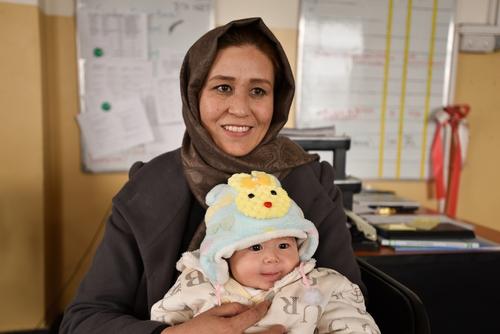On International Women’s Day 2017, Médecins Sans Frontières (MSF) celebrates the women of Afghanistan, and highlights the dangers they face during pregnancy and childbirth.
Afghanistan remains one of the most dangerous places in the world to give birth. Every year around 4,300 women will die due to a complication during pregnancy or childbirth
Aqila is midwife supervisor in Dasht-e-Barchi hospital maternity department in Kabul, managed by MSF in partnership with the Ministry of Public Health. Working as a vaccinator in a rural health centre, she decided to become a midwife to help make childbirth safer for fellow Afghan women. “I’ve seen a lot of women in my life dying during delivery or after delivery. And I’ve seen children growing up without their mother. It’s a very sad thing.”
MSF aims to reduce mortality and morbidity in mothers and their newborns through the provision of free, high-quality maternal and neonatal healthcare in four hospitals in Afghanistan. Of all the births assisted by MSF worldwide, one in four takes place in Afghanistan, and our medical teams helped deliver more than 66,000 babies in 2016.
One of the key barriers to safe delivery is the lack of female doctors and midwives.

For several decades, Afghan women have been unable to access education, leading to a shortage of trained female staff to look after women in labour. Yet at the same time many families will only seek care from a female medical provider due to Afghanistan’s cultural gender norms. This dilemma is one reason why up to two thirds of babies are born at home, unassisted. All of MSF’s projects in Afghanistan emphasise training local female staff. By strengthening their skills, MSF is helping ensure its projects can respond better to the needs of women.
Almost all the midwives assisting deliveries in our programs are Afghan women. Since the women’s-only maternity hospital opened in rural Khost province in 2012, a number of female doctors have also become highly experienced in managing complicated deliveries. They have been trained by international staff like obstetrician-gynaecologist Dr Séverine Caluwaerts, who has worked in Khost seven times.
“Two of our national doctors, Dr Sadia and Dr Farida, I basically taught them their first caesarean section and now so many years later they are independent,” says Dr Caluwaerts.
While MSF provides free healthcare, many other clinics across the country charge for their services. “A lot of people have economic problems which means they don’t have money for antenatal care or to see a gynaecologist,” says Aqila. “The women are demotivated to go to private expensive hospitals so they try to deliver at home. Many of them don’t know about the complications of pregnancy and delivery.”
Antenatal care is crucial for identifying and mitigating complications, which can have a big impact on the health of the newborn.
Nadya recently gave birth to her first baby in Ahmad Shah Baba hospital, jointly-run by the Ministry of Health and MSF in Kabul, but like many Afghan women had received very limited antenatal care. In fact more than 40 per cent of Afghan women receive no antenatal care during pregnancy – a figure MSF is trying to help reduce through health promotion activities and provision of free care. Nadya’s baby was born with a mild, treatable spina bifida, but if it had been detected during pregnancy, Nadya and her family could have been supported to prepare for the birth and any follow-up.


